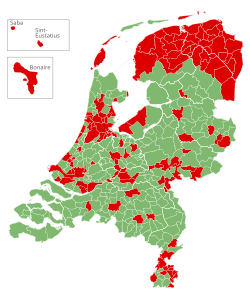| Dutch Intelligence and Security Services Act 2017 referendum | |||||||||||||||||||||||||
|---|---|---|---|---|---|---|---|---|---|---|---|---|---|---|---|---|---|---|---|---|---|---|---|---|---|
| Location | Netherlands | ||||||||||||||||||||||||
| Date | 21 March 2018 | ||||||||||||||||||||||||
| |||||||||||||||||||||||||
| |||||||||||||||||||||||||
A consultative referendum on the Intelligence and Security Services Act 2017 was held in the Netherlands on 21 March 2018 alongside with the municipal elections. It was the second referendum to be held under the Dutch Consultative Referendum Act after the 2016 Ukraine–European Union Association Agreement referendum.

In the Netherlands, from the entry into force of the Advisory Referendum Act on 1 July 2015, until its repeal on 18 February 2018, most types of primary laws could be subjected to a suspensory, non-binding referendum if requested shortly after royal assent and subsequent proclamation. If a law was rejected by more than half of the votes cast, with a mandatory turnout of at least 30%, its entry into force was be suspended indefinitely and a follow-up law had to be enacted that either repealed the law or provided for its entry into force.

The Netherlands is a country located mainly in Northwestern Europe. The European portion of the Netherlands consists of twelve separate provinces that border Germany to the east, Belgium to the south, and the North Sea to the northwest, with maritime borders in the North Sea with Belgium, Germany and the United Kingdom. Together with three island territories in the Caribbean Sea—Bonaire, Sint Eustatius and Saba— it forms a constituent country of the Kingdom of the Netherlands. The official language is Dutch, but a secondary official language in the province of Friesland is West Frisian.
Contents
- Background
- Request
- Party positions
- Opinion polls
- Vote in referendum
- Support for the law
- Results
- Results by province or territory
- References
- External links
A plurality of voters (49.44%) voted against the law, resulting in its rejection. Voter turnout was 51.5%, above the 30% threshold for validation of the result. [1] Although the referendum itself was non-binding, Prime Minister Mark Rutte had promised to take the No vote into account prior to the referendum. [2]

The Prime Minister of the Netherlands is the head of the executive branch of the Government of the Netherlands in his quality of chair of the Council of Ministers. The Prime Minister is de facto the head of government of the Netherlands and coordinates its policy with his cabinet. The current Dutch Prime Minister is Mark Rutte, in office since 2010.

Mark Rutte is a Dutch politician serving as the 50th and current Prime Minister of the Netherlands since 2010 and Leader of the People's Party for Freedom and Democracy since 2006. Rutte was previously appointed as State Secretary for Social Affairs and Employment from 22 July 2002 to 17 June 2004 and as State Secretary for Education, Culture and Science from 17 June 2004 until 27 June 2006, when he was elected to succeed Jozias van Aartsen as the new VVD Leader.
















